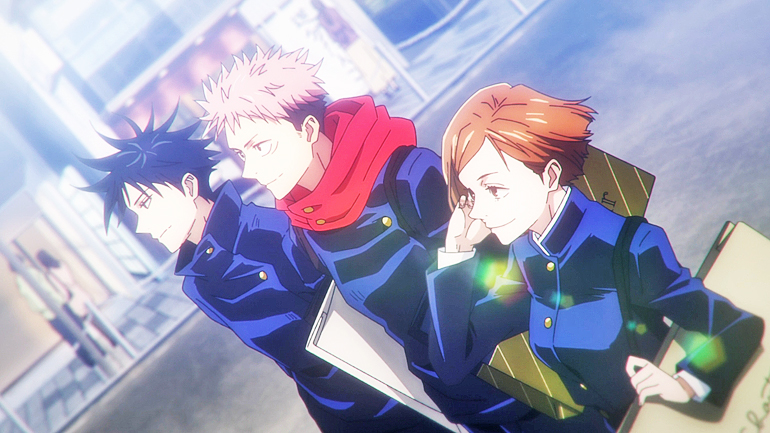Engaging with anime offers a profound and often therapeutic avenue for individuals to navigate their mental landscape. The diverse array of themes, genres, and narratives present in anime provide a rich range of emotional experiences that can resonate deeply with viewers.
Whether immersing oneself in the fantastical worlds of Studio Ghibli or delving into the complex character studies of psychological thrillers, anime serves as a mirror reflecting the multifaceted aspects of human emotion.
Through identification with characters, viewers find solace in knowing they’re not alone in their struggles, fostering a sense of empathy and connection.
Moreover, the act of watching anime can offer a temporary escape from the demands of reality, allowing for a therapeutic respite where individuals can decompress, unwind and recharge.
In this article, we dive into the world of Jujutsu Kaisen, a captivating and exhilarating anime that has taken the world of animation by storm with its dynamic blend of supernatural battles, intricate lore and compelling characters.
Produced by Studio Maruyama Animation Produce Project Association (MAPPA), the show’s first season first aired on Netflix sometime in 2020, adapted from Gege Akutami’s manga.
The dark fantasy series follows the journey of Yuji Itadori (voiced by Junya Enoki), an ordinary high school student who becomes entwined in a realm of curses, sorcery, and danger.
As Yuji joins a clandestine organisation combatting curses and malevolent spirits, viewers are plunged into a mesmerising world of intense combat sequences, emotional turmoil and a richly woven narrative exploring the thin line between human vulnerability and supernatural prowess.

BACKGROUND OF JUJUTSU KAISEN
In the world of Jujutsu Kaisen, there exists a phenomenon known as ‘Juryoku’ (cursed energy), an aura of energy emitted by all living beings.
This mystical energy originates from the currents of negative emotions that course through the human body.
However, this flow of energy remains beyond the control of ordinary individuals, leading to a continuous dissipation of Cursed Energy.
This dissipation culminates in the manifestation of ‘Noroi’ (curses), an ethereal species driven by an innate urge to inflict harm upon humanity.
These curses take on various forms, ranging from ghastly monsters to spectres and supernatural creatures known as yōkai.
Each curse embodies the malevolent essence of the emotions that birthed them, making them potent and often terrifying entities.
Individuals known as ‘Jujutsushi’ (Jujutsu sorcerers), often referred to as “cursed technique masters”, possess the remarkable ability to regulate and manipulate the coursing cursed energy within their own bodies.
This mastery empowers them to harness this energy at will, exercising control over its discharge.
Accomplished sorcerers, alongside formidable curses, can refine this enigmatic energy, fashioning it into what is termed ‘Jujutsushiki’ (cursed techniques).
These techniques are often distinctive to the practitioner or their lineage, displaying a sense of individuality.
One elevated manifestation of cursed technique is ‘Ryōiki Tenkai’ (domain expansion), where adept users craft a distinct pocket dimension whose dimensions may vary.
Within this enclosed realm, the efficacy of their assaults is amplified, guaranteeing unfailing connections and augmenting their potency over time.
THE PLOT IN SUMMARY
Residing in Sendai, Yuji Itadori is an extraordinary high school student brimming with vitality.
As fate would have it, a significant turning point occurs when his ailing grandfather imparts two profound principles: the unwavering commitment to aid others and the aspiration to depart from this world encircled by companions.
These words etch themselves deeply into Yuji’s being.
The Occult Club, Yuji’s close-knit group of friends, unknowingly triggers a sequence of events that summons malevolent curses onto their school premises by unsealing a decayed finger talisman.
In an act of selflessness, Yuji consumes the tainted finger, thereby shielding Jujutsu sorcerer Megumi Fushiguro (voiced by Yuma Uchida) from harm.
This impulsive act inadvertently results in Yuji becoming the unwilling host of a formidable curse known as Ryomen Sukuna (voiced by Jun’ichi Suwabe), whose sinister essence is undeniable. Compelled by the inherent malevolence of Sukuna, the sorcerers’ code demands the immediate exorcism of both the curse and Yuji.
Yet, an unexpected twist unfolds as Yuji demonstrates an unprecedented mastery over his own body.
Recognising this extraordinary feat, Megumi’s mentor, Satoru Gojo (voiced by Yûichi Nakamura), orchestrates a daring proposition to his superiors – a temporary reprieve from Yuji’s death sentence.
This reprieve is contingent upon Yuji’s intensive training under Gojo’s guidance, with the ultimate goal of devouring all 20 of Sukuna’s fingers, a condition necessary for the annihilation of the formidable Curse.
THE ART STYLE OF JUJUTSU KAISEN
Now in its second season with currently four episodes, viewers can notice a difference in art styles used between the current and prior season.
According to Dexerto, while the first season boasts intricate and detailed animation, the second season adopts a more streamlined and polished aesthetic.
The summer flashback arc in the high school theme is accentuated by a soothing blue tone that evokes a vibrant summer vibe, perfectly setting the mood in the second season.
Excessive detailing is avoided in it as it can potentially distract from the central focus.
This deliberate choice has sparked differing opinions within the Jujutsu Kaisen fandom, resulting in a divided sentiment.
While many fans appreciate the elegance and beauty of the uncomplicated animation, some yearn for the level of detail seen in previous moments, proving that art is indeed subjective and open to interpretation.
One of the main reasons for the change may also be attributed to the fact that the director for the second season was changed from Sunghoo Park to Shōta Goshozono, who demonstrates a distinct and unparalleled approach in seamlessly transitioning between scenes.
Another possible reason that was noted could be MAPPA’s simultaneous undertaking of several big projects.
This decision, however, does come with a silver lining as it enables them to craft heightened and swiftly moving action sequences.
Jujutsu Kaisen stands as a testament to the potency of modern anime, seamlessly fusing adrenaline-pumping action with thought-provoking themes, and leaving an indelible mark on the genre. – Izah Azahari








